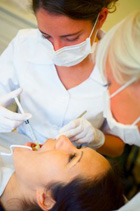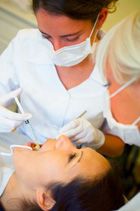 Taking good care of your teeth begins at home with how you look after your teeth. You ought to be brushing and flossing at least twice a day for about three minutes. As well you should be vigilant for any problems which you think are occurring in your mouth. But all this must be done in conjunction with your dentist, as these experts play a crucial role in keeping your whole mouth as healthy as it can be.
Taking good care of your teeth begins at home with how you look after your teeth. You ought to be brushing and flossing at least twice a day for about three minutes. As well you should be vigilant for any problems which you think are occurring in your mouth. But all this must be done in conjunction with your dentist, as these experts play a crucial role in keeping your whole mouth as healthy as it can be.
Most general dentistry really consists of giving you, the patient, expert advice. Your dentist can examine your mouth and tell you how best to take care of your teeth. They might be able to spot particular areas where plaque is building up, allowing you to modify your own cleaning techniques. Your dentist will be able to tell if you are brushing too hard because of the damage it might inflict on your teeth and gums. This is something that you yourself might not notice so visits to the dentist are very important.
Your dentist might decide that what you need is scaling and polishing to remove plaque that has hardened into tartar and can only be removed in the surgery. Problems with the alignment of your teeth might be spotted by your dentist who could advise that you have a brace fitted.
There are usually plenty of dentists to choose from, especially if you live in a built up, urban area. Choose your dentist carefully based on areas of expertise, if you suffer from a persistent problem with your gums for example.
Your Central Leeds dentist will be able to tell you all about the general dentistry procedures that are on offer at his or her practice.





 A dentist from the City of Leeds was very concerned about the dropping standards of oral hygiene even though there are so many dental cleaning products available in the market today. People are still not very educated about how to protect their teeth and in turn, their health. The doctor even talked about the importance o getting regular checkups done so that any problems could be nipped in the bud. A thorough cleaning could also be set up during the time of the dental check up.
A dentist from the City of Leeds was very concerned about the dropping standards of oral hygiene even though there are so many dental cleaning products available in the market today. People are still not very educated about how to protect their teeth and in turn, their health. The doctor even talked about the importance o getting regular checkups done so that any problems could be nipped in the bud. A thorough cleaning could also be set up during the time of the dental check up. Plaque is the soft, sticky substance that surrounds the teeth. It is mostly made from bacteria and releases acid that dissolves minerals in the enamel of the tooth, causing dental cavities, tooth decay and infections. Plaque that builds up around the gums can break down gum tissue leading to painful gum disease, which results in bleeding and possibly even heart disease. It is therefore very important to keep plaque under control with effective brushing and flossing at home.
Plaque is the soft, sticky substance that surrounds the teeth. It is mostly made from bacteria and releases acid that dissolves minerals in the enamel of the tooth, causing dental cavities, tooth decay and infections. Plaque that builds up around the gums can break down gum tissue leading to painful gum disease, which results in bleeding and possibly even heart disease. It is therefore very important to keep plaque under control with effective brushing and flossing at home. A relatively new weapon in the war against dental disease is the dental hygienist. More and more dental practises across the country are using hygienists to supplement the treatment offered by the dentist, to provide the most comprehensive dental care possible.
A relatively new weapon in the war against dental disease is the dental hygienist. More and more dental practises across the country are using hygienists to supplement the treatment offered by the dentist, to provide the most comprehensive dental care possible.

